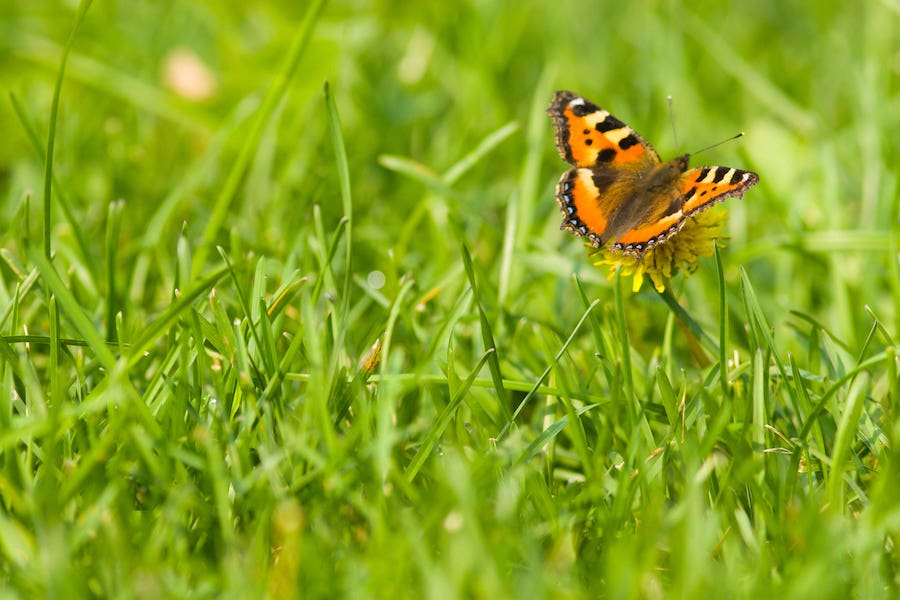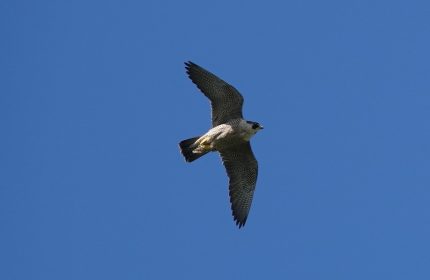How to bring your lawn to life
Experiment to create a new look green space
Gardeners are being asked to reimagine their lawns this summer with a Bring Your Lawn To Life initiative from The Wildlife Trusts and the RHS.
The charities are encouraging gardeners to experiment with a new look lawn in 2023 – for the benefit of wildlife and also the wider environment.
They are inviting people to raise the blade on their mower and cut their grass less regularly, embrace daisies, dandelions, clovers and other naturally flowering plants, and even grow container lawns if space is at a premium.
View this post on Instagram
“Our lawns might not seem the obvious way to support wildlife in our gardens, but they have huge potential to create space for nature,” says Helen Bostock, senior wildlife specialist at the RHS.
“By adopting a more relaxed approach to your lawn, letting it grow a little wilder and longer in places, you will be inviting a whole range of species in, from pollinators to earthworms and all the other wildlife that relies on them.
“There’s even the added benefit of a more diverse lawn staying greener during dry spells and providing a cooler spot on hot days.”
The RHS offers the following advice…
Leave bare ground

It can be tempting to try and seed over or plant up bare patches, but a few areas without any planting gives space for insects such as mining bees to burrow down and build their nesting tunnels.
No need to feed

Feeding your established lawn isn’t necessary to get a luscious-looking space, and is also an intensive use of money and resources that might not pay off. For short patches of grass, such as paths through the lawn, you could save yourself time and leave grass clippings to add some nutrients.
Longer areas need clippings collected at the end of the season, but the longer roots of tall species will give these grasses better access to nutrients and water deep in the soil.
Love your earthworms

Gardeners can collect the fine soil from worm casts to add to potting media, or leave these patches of earth for new plants to establish within the lawn.
The worms under your turf can help to aerate the soil, recycle nutrients and are food for blackbirds, hedgehogs and many other animals.
The grass isn’t always greener
View this post on Instagram
If you want a green area in the garden then you might be better off looking somewhere other than grasses, particularly as our summers are more prone to drought with the changing climate.
Yarrow and plantain will stay green during drought periods while also providing food for pollinators, so are ideal for welcoming more wildlife into the garden and keeping green shades through the summer.
Embrace a mossy harvest
View this post on Instagram
Removing moss can involve a lot of hard work, but there are ways to make the most of your moss. Lots of birds incorporate moss into their nests, so leave any removed material out for them to collect.
Lawn moss also makes a good base for seasonal wreaths, so you could recycle it into crafting material.
But leaving the moss will add damper micro-habitats into your lawn – perfect for a diversity of microfauna like rotifers, free-living nematodes and tardigrades (known as water bears) that contribute to nutrient cycling and thus healthy soils and plants.
Welcome fungi

The little brown mushrooms on your lawn won’t be doing any harm to the garden, and lots are especially beautiful when the light passes through their translucent gills. Many species will even be beneficial, recycling decaying matter back into the soil.
Experience nature

Just being outside in nature can help restore us after a period of stress, and what better way to experience this than walking barefoot on the grass?
Prevent floods
Any lawn is better than nothing – compared to a garden of hard surfaces, one covered by a lawn and plants will help prevent flash flooding locally, reduce air and noise pollution and have a cooling effect. The wilder you let your lawn grow, the bigger the benefit to nature and planet.
For more information on the benefits of lawns in gardens, download a copy of the Bring Your Lawn To Life guide on the charities’ joint Wild About Gardens website.
The Press Association
Latest posts by The Press Association (see all)
- Actor Richard Chamberlain dies aged 90 - March 30, 2025
- 5 new books to read this week - March 26, 2025
- 6 things a physio wishes people over 60 would stop doing - March 25, 2025
- NHS reminder to 7.5m people as Covid-19 jab booking system opens - March 25, 2025
- The truth about cholesterol – what you need to know - March 25, 2025




















